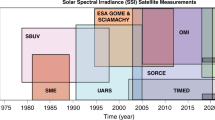Abstract
IN the preceding communication, Martyn has shown X that at wavelengths of a few metres, thermal radiation corresponding to a temperature of about & million degrees should be radiated from the sun. The detection of this radiation is complicated by the presence of a further source, which is highly variable and is associated in some way with sunspots. This sojmje can, bn occasion, yield radiation up to 100 times the expected thermal intensity. If we confine ourselves to intensity measurements, it would in fact be detectable only if the intensity due to the variable source, not infrequently fell below that of the thermal one.
This is a preview of subscription content, access via your institution
Access options
Subscribe to this journal
Receive 51 print issues and online access
$199.00 per year
only $3.90 per issue
Buy this article
- Purchase on Springer Link
- Instant access to full article PDF
Prices may be subject to local taxes which are calculated during checkout
Similar content being viewed by others
Author information
Authors and Affiliations
Rights and permissions
About this article
Cite this article
PAWSEY, J. Observation of Million Degree Thermal Radiation from the Sun at a Wavelength of 1.5 Metres. Nature 158, 633–634 (1946). https://doi.org/10.1038/158633a0
Issue Date:
DOI: https://doi.org/10.1038/158633a0
This article is cited by
-
First Solar Radio Burst Observations by the Mexican Array Radio Telescope (MEXART) at 140 MHz
Solar Physics (2022)
-
Major Advances in Radio Astronomy: Some Key Questions Today
Proceedings of the National Academy of Sciences, India Section A: Physical Sciences (2015)
Comments
By submitting a comment you agree to abide by our Terms and Community Guidelines. If you find something abusive or that does not comply with our terms or guidelines please flag it as inappropriate.



